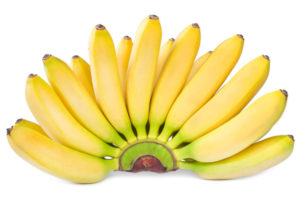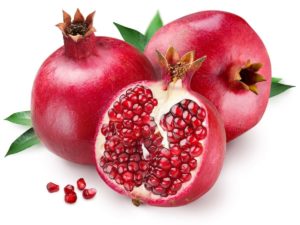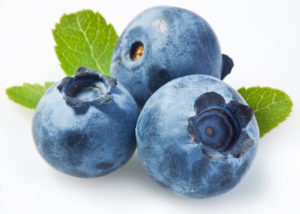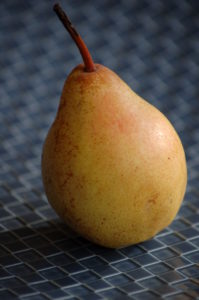Fruits make so much sense – some of them come ready-wrapped (think oranges or bananas), and many are not only tasty but really good for you too. However, they vary very much in carb content, so it’s best to know what you’re up to when taking your pick.
We are not meant to compare apples and pears, but we do tend to think of them together – they’re British crops and have been for centuries, and their trees are in blossom gearing up to give us a happy harvest in a few months time.
A lovely pear
Pears are packed with health benefiting nutrients such as fibre anti-oxidants, minerals and vitamins. It’s a low calorie fruit (58 cal per 100g), and one pear is about 15-20g carbs and contains good quantities of vitamin C (about 7% of RDA per 100g). Pears should be eaten as a whole with skin to get maximum benefits. Vitamins and minerals are greatly concentrated in significant quantities just underneath the skin. It’s believed that the fruit can be useful in treating colitis, chronic gallbladder disorders, arthritis and gout. Regular eating of pears may offer protection against colon cancer. Just a few sections a day in the diet can bring significant reduction in weight and blood LDL cholesterol levels.
Top banana
 Bananas are in calories, and carbs (1 medium banana is around 20-25g carbs) but they’re very low in fats. The fruit contains good amounts of health benefiting anti-oxidants, minerals, and vitamins. It is also a very good source of vitamin-B6 (pyridoxine), providing about 28% of daily-recommended amount. The fruit is also good source of vitamin C (about 8.7 mg per 100g). Fresh bananas provide minerals like copper, magnesium, and manganese. In particular, fresh banana is a very rich source of potassium.
Bananas are in calories, and carbs (1 medium banana is around 20-25g carbs) but they’re very low in fats. The fruit contains good amounts of health benefiting anti-oxidants, minerals, and vitamins. It is also a very good source of vitamin-B6 (pyridoxine), providing about 28% of daily-recommended amount. The fruit is also good source of vitamin C (about 8.7 mg per 100g). Fresh bananas provide minerals like copper, magnesium, and manganese. In particular, fresh banana is a very rich source of potassium.
Super fruits
 Among the many fruits out there, some of them seem to have extra health-giving benefits, making it even more sensible to eat your fill of them. One of these is pomegranate, which has been revered since ancient times. Low in calories (100g provides 85 calories, slightly more than apples), it contains no cholesterol or saturated fats while being a rich source of fibre, which aids healthy digestion. It has antioxidents as well as vitamins and minerals.
Among the many fruits out there, some of them seem to have extra health-giving benefits, making it even more sensible to eat your fill of them. One of these is pomegranate, which has been revered since ancient times. Low in calories (100g provides 85 calories, slightly more than apples), it contains no cholesterol or saturated fats while being a rich source of fibre, which aids healthy digestion. It has antioxidents as well as vitamins and minerals.
Another superfruit is the blueberry. Also very low in calories (100g fresh berries is only 57 calories). The berries contain health benefiting soluble dietary fibre, minerals, vitamins, and pigment anti-oxidants that contribute immensely for optimum health and wellness. As a fruit, they have one of the highest levels of anti-oxidants which help protect the  body from cancers, aging, degenerative diseases, and infections. Research has also suggested that the chlorogenic acid in these berries help lower blood sugar levels and control blood glucose levels in Type 2 diabetics. The berries also contain very good amounts of vitamin B-6, niacin, riboflavin, pantothenic acid and folic acid — vitamins that help body metabolize carbohydrates, protein, and fats.
body from cancers, aging, degenerative diseases, and infections. Research has also suggested that the chlorogenic acid in these berries help lower blood sugar levels and control blood glucose levels in Type 2 diabetics. The berries also contain very good amounts of vitamin B-6, niacin, riboflavin, pantothenic acid and folic acid — vitamins that help body metabolize carbohydrates, protein, and fats.
Nutrition
Pear per 100g: 60 calories, zero fat, very little protein,15g carbohydrates, dietary fibre 12%, Vitamin C 7%.
Banana per 100g: 90 calories, zero fat, very little protein, 24g carbohydrates, dietary fibre 10%, Vitamin C 14%j,Vitamin B-6 20%.
Pomegranate per 100g: 80 calories, zero fat, very little protein, 20g carbohydrates, dietary fibre 10%, Vitamin C 17%.
Blueberry per 100g: 60 calories, zero fat, very little protein, 14g carbohydrates, dietary fibre 9%, Vitamin C 16%.
Per cent Daily Values are based on a 2,000 calorie diet.
Food features and recipes like this appear in the Desang Diabetes Magazine, our free-to-receive digital journal. We cover diabetes news, diabetes ‘kit’ and information on food suitable for maintaining good blood glucose control or a diabetic diet, including a regular Making Carbs Count column. It’s free! Go to the top of this page to sign up – we just need your email address. See current and past issues at
www.desang-magazine.co.uk
Open publication


